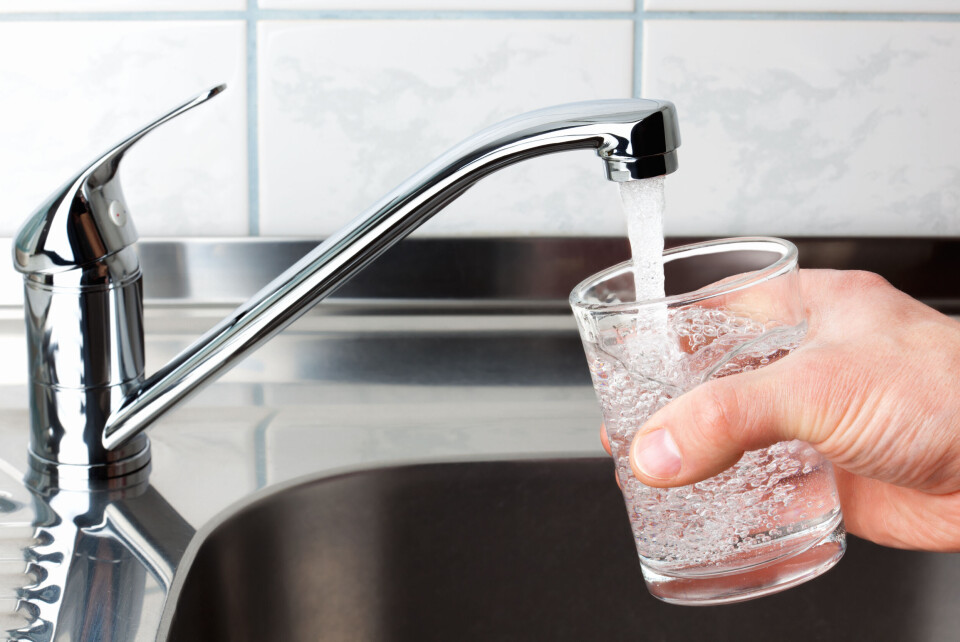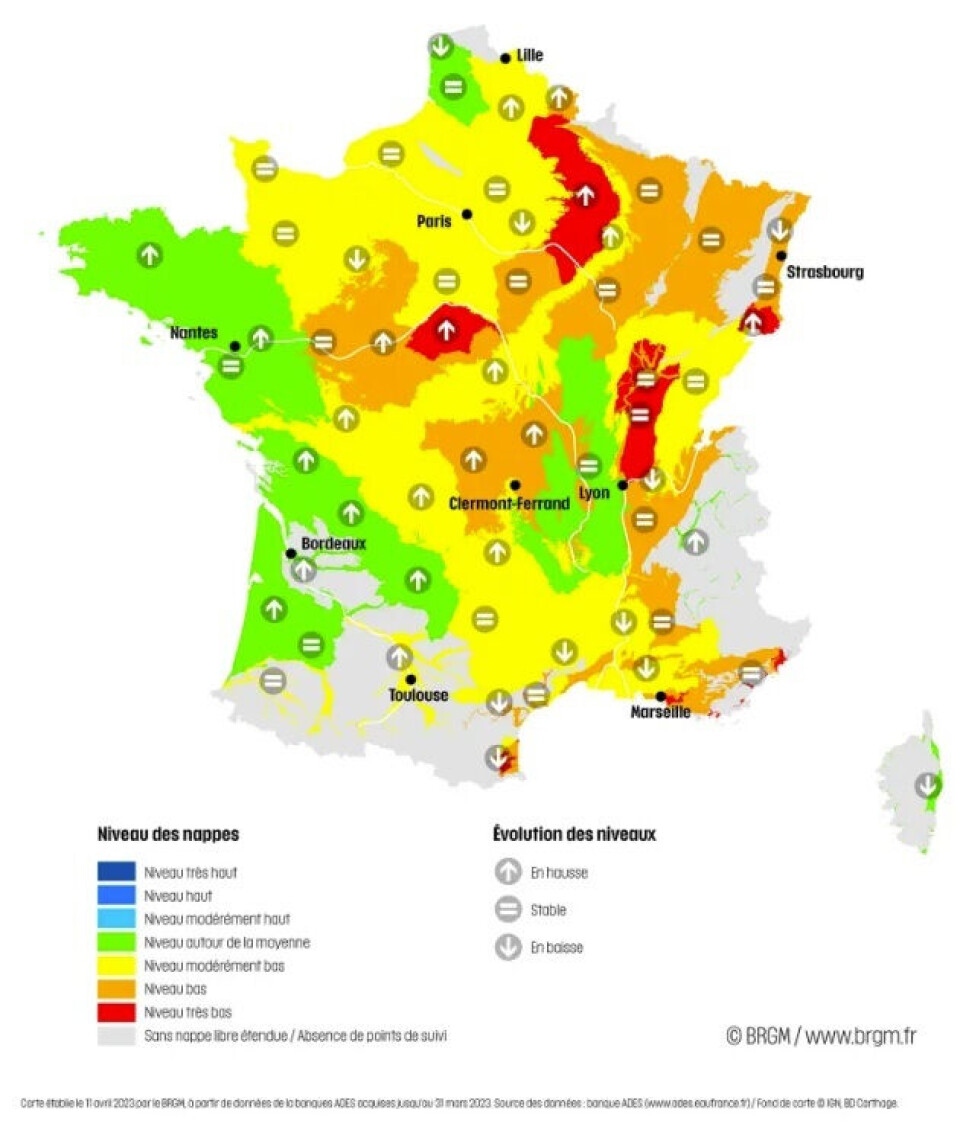-
Britons are the largest foreign community of second-home owners in Nouvelle Aquitaine
See which other departments in the region are popular with British nationals
-
Travellers risk extra costs under new Eurotunnel ticket rule
Some fare options are less flexible and less forgiving of lateness
-
May will be difficult month for train travel in France, warns minister
Two major train unions are threatening to strike and are ‘not willing to negotiate’, he says
Tap water ban in four villages in southern France as shortages bite
Tap water consumption has been banned in four communes in the south of France.

It comes in the context of worsening drought across France, and one day after the geological research office le Bureau de recherches géologiques et minières (BRGM) warned that 75% of groundwater is below the norm. This is up from 58% at this time last year.
The communes affected by the ban are near Perpignan in the Pyrénées-Orientales department: Corbère, Corbère-les-Cabanes, Saint-Michel-de-Llotes and Bouleternère.
Water table situation, as of April 1
Map: BRGM / brgm.fr

Part of the Pyrénées-Orientales is at a “very high” risk of drought this summer, the BRGM said. It also alerted these four communes to the low level of drinking water.
This led the communes to decide to ban water consumption pending new connections in the coming days.
On Facebook, the mayor of Corbère-les-Cabanes said: “The level of the drinking water borehole on Bouleternère has reached its withdrawal threshold. While waiting for the new drilling connection to take over, tap water is banned for consumption until [regional health agency] l’Agence Régionale de Santé authorises it".
It also said that it would give out a free "pack of water per person per week".
‘Severe deficit’
The BRGM said that the “recharge period [September-March] from 2022 to 2023 was marked” by some dry periods, which explains the weak filtering of rain into deep [underwater tables], due to very dry ground…
“The end of winter 2022-2023 was marked by a severe deficit in effective water, and February 2023 was characterised by dropping levels.”
It said that “the rain [had] moistened the ground and allowed vegetation to grow and establish dominance, before it was able to infiltrate deeply”.
Violaine Bault, BRGM hydrologist, told Midi Libre: “The situation is worrying because all of France is affected, and this is the result of several dry years.”
Météo France said earlier this month that groundwater levels had “returned to values near to the normal in France, following a return of rain across a large part of the country”.
But, it said, there was still a 10% deficit. It added ground in the south and southeast, which was already dry at the end of February, continued to dry out, especially in Aude and Pyrénées-Orientales.
How can I save water in France?
The Mairie of Corbère-les-Cabanes, one of the communes affected by a drinking water ban, also asked citizens to “save water as much as possible”.
It reminded residents that other water restrictions are also in place, including:
-
Watering grass or gardens
-
Washing cars
-
Filling swimming pools
-
Cleaning façades and terraces
Other ways to save water include:
-
Take a shower instead of a bath. This saves around 125 litres per wash, for a short shower.
-
Buy an energy-saving showerhead
-
Install a low-flow toilet flusher. Each normal toilet flush uses up to 36 litres.
-
Use your dishwasher. This saves water compared to washing manually.
-
Check for (and repair) leaks and dripping appliances. This could save you hundreds of litres.
-
Limit garden watering (if your department or commune has not already banned it)
Read more: Seven tips on how to save water and reduce your bills in France
How can I see the situation in my department?
Many water restrictions are already in place across much of France. The government website Propluvia provides a regularly-updated map of the levels of water alert, along with a legend showing the related restrictions.
The following map shows the state of alerts on water usage limitations in France, as of April 14.
Map: ConnexionFrance / updated every week
-
Grey: Awareness, information, and encouragement to save water
-
Yellow: Alert. 50% reduction of water use for farming, ban on water activities, time restrictions on activities such as watering gardens and golf courses, and washing cars
-
Orange: High alert. 50% or more reduction in farming use. More restrictions on watering gardens, golf courses, and car washing
-
Red: Crisis. Ban on all non-priority use. Only allowed for priority use such as health, civil safety, drinking water, and cleanliness, except where stated otherwise.
Read more: Vigilance, alert, crisis: what France’s four drought warnings mean
What is the government doing to help?
In January, France’s ecology minister, Christophe Béchu, introduced the government’s national water plan. This includes a series of measures designed to reduce the amount of water being taken from the ground, and the creation of a new app to help people monitor their water usage.
President Emmanuel Macron also presented more details on the plan at the end of March, including 53 measures designed to save water and improve its availability.
“Nature isn’t leaving us any choice,” Mr Béchu said.
“I don’t get up in the morning and think, ‘It would be good to force people in France to consume less water.’ But it’s a consequence of climate change that we all need to adapt to. As the president has said, we must get used to the end of ‘total abundance’, including for water.”
Read more: How France plans to tackle increasing water shortages
Some cities and towns have also been authorised to use treated wastewater for certain activities where possible, to avoid the use of clean drinking water in situations where it is not needed (such as street cleaning and vehicle washing).
The plan is also to eventually use treated wastewater for flushing toilets and other individual home tasks that do not require drinking water.
Related articles
France allows local authorities to use wastewater after record drought
Drought in France: 2023 set to be ‘very dry year’
Traces of banned pesticide found in French tap water
























